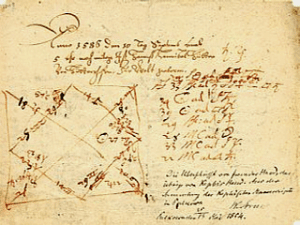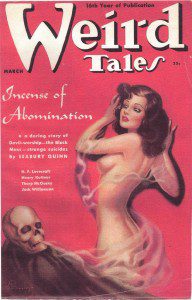Last time, I voiced some objections to the James Randi Educational Foundation’s booklet “Astrology: Superstition Or Science?” For those of you who have an appetite for extensive detail, here are my notes on it. If you recognize the value of astrology, you should really see what these folks are saying about you. For the rest of you: my apologies for the necessarily long-winded digression. We’ll get back to your regularly-scheduled astrology next time.
Since the stated purpose of JREF is to encourage “critical thinking,” I applied some to the booklet in question and discovered errors on pretty much every page. If anyone from JREF is reading this, and since I think critical thinking is awesome, I hereby volunteer this blog entry as an addendum to your booklet, because re-writing your text to take out the errors would leave two blank pages for notes and a couple of reproductions of old woodcuts… unless of course the whole point of the booklet was to have students do a little research on their own and figure out how riddled with faulty thinking, misleading statements, and outright untruths your whole booklet is.
***
Page 1: Hey, who wrote this thing? When I was in school all our textbooks had an author or an editor or someone who got credit. Not knowing who wrote this doesn’t make it invalid, but it seems bad form not crediting the author. As a writer myself, I’m sensitive to that sort of thing.

Page 2: Yes, when it comes to astrological rulerships of the body parts, that’s roughly how it works. But your usage of the term “fanciful” seems a bit disparaging. Woodcuts like this were hand-made by artists, and they tended to be a little… well, fanciful. Nobody slapped together a PowerPoint Presentation from clip art back then. As an example, over to the left I’ve included a woodcut by Titian from a few centuries earlier showing the muscles of the body. It’s pretty fanciful too (what is that in the background, Venice?) but being “fanciful” doesn’t make it inaccurate.
Question For The Class: Does the age of a visual representation necessarily dismiss the validity of the information being presented? Does misleading information become any more “true” when presented in a neatly desktop-published form? Discuss.
Now that we’re done with the nitpicking, let’s move on to the stuff that’s really worthy of our skepticism.
Page 3: Ah, The Million Dollar Challenge. For those of you not familiar with it, that’s the challenge to provide proof of the paranormal that no one ever wins because JREF sets ridiculous standards, then moves the bar when you achieve them anyway. Are you guys looking for donations from high school students? Good luck with that. Even the classes I enjoyed in high school never prompted me to mail twenty bucks to Dr. Erno Lampert for his excellent work promoting geography, or whatever. Of course, being a non-profit, I can understand why you’re asking for money.
Question For The Class: Dennis Rawlins, a former associate of James Randi, quoted James Randi as saying “I always have an out” when it comes to not paying off the Million Dollar Challenge. Randi countered by saying his full quote was actually “Concerning the challenge, I always have an ‘out’: I’m right!” Does either version of the statement indicate a pre-existing bias on the part of James Randi? Discuss.
Page 4: Nice wood cut. No objections here.
Page 5: “Astrology is one of the oldest thinking errors of our species.” Well, there goes “critical thinking.” But in all fairness, I realize you guys have a horse in this race and you’re going to back it, just like I do.
“Astrology, though thoroughly debunked in so many ways, still attracts a large fraction of our planet’s people, unfortunately. But don’t just accept my word for it. Here you can have a really scientific method by which you, yourself, can examine the evidence about astrology and arrive at your own conclusions.”
What, no “Is it all a crock, or could there be some truth to it?” at the beginning like so many badly-written “documentaries” on The History Channel about the paranormal, that always conclude with something like “well, there you go, figure it out for yourself?” Where’s the encouragement of critical thinking skills here? Perhaps JREF should branch out into Film Criticism: “Citizen Kane actually sucks, but don’t take our word for it… here’s a list we assembled of all the reasons it sucks, so we could spare you actually having to watch a sucky movie like Citizen Kane, because it sucks. You’re welcome.”
Page 6: “Astrology started with calculations and observations, then filled the gaps with assumptions of the supernatural.” Now, are you saying that there’s no way an astrologer could have used observation to come to any of their conclusions, or are you just assuming that if it isn’t astronomy, it’s superstition? Or are you simply decrying the human urge to say “God knows”? Isn’t this an example of you making some dodgy assumptions about who’s making dodgy assumptions?
Page 7: No complaints here. Nice woodcut.
Page 8: “Do you think it would be fair to judge someone based on his or her zodiac sign? If it is not okay to refuse to hire someone because of their gender or race, is it okay to refuse to hire them because of their sign? Why or why not?”
Well, um, okay. Obviously that wouldn’t be fair. But I haven’t heard of whole lot of people who’d refuse to hire a well-qualified Leo because of their Sun Sign, or whatever, but I’ve heard there’s a whole lot of people who wouldn’t hire a well-qualified Asian or Mormon or whatever because of their race or religion. It seems to me that what you’re actually complaining about here is bigotry, not astrology.
Question For The Class: According to a Gallup Poll, about 9 in 10 Americans believe in God in some form or another. How many people who work for The James Randi Educational Foundation believe in God, and if that figure is less than about 90%, does that represent a form of bigotry on the part of JREF, or is it merely a statistical anomaly? Discuss.
Student exercise: Name three forms of bigotry that have nothing to do with astrology. Do you think the forms of bigotry you named are more of a problem, less of a problem, or the same size of a problem as Sun Sign bigotry?
Bonus Question: If your ancestors have been in the country three generations or less, ask a parent or grandparent if anyone discriminated against them because of that, or if they faced discrimination because of their Sun Sign.
Page 9: “Heliocentrism completely changed our view of the universe and our place in it. It left little room for astrology.”
Heliocentrism was an important intellectual leap. And yes, an astrological birth chart might make it look (at first) like astrologers think the Earth is at the center of the Universe. In fact, however, a birth chart looks like that because that was the perspective from Earth at the time of birth of the person in question.
Question For The Class: Imagine you are driving through Wyoming. Your road map shows Fremont County at the center. Does this imply that map-makers think Fremont County is the center of the Universe? Discuss.
Page 10: “More than 400 years ago, astrology was considered obsolete.”
Johannes Kepler was an astronomer and mathematician who lived in the 1600s (which was about 400 years ago, for those of you who don’t like math), who discovered the laws of planetary motion and laid much of the foundation for Sir Isaac Newton’s work on gravity.

Pictured at right is an astrological birth chart drawn by Johannes Kepler. We have on record two letters from Kepler discussing his family’s horoscopes and the astrological reasons for his son’s death. That was in 1611… two years after Kepler published his Astronomia Nova, which demonstrated how the planets orbit the Sun in elliptical orbits… thus confirming the validity of Heliocentrism. Surprise!
Question For The Class: Define “obsolete.”
“Hundreds of millions of dollars each year are spent consulting with astrologers in the United States alone.”
I know a lot of astrologers, and believe me, when we get together to discuss business we don’t congratulate ourselves on our wildly profitable cunning and bust out the top hats and monocles like capitalists in a 1930s editorial cartoon from Bolshevik Worker’s Weekly. Pretty much any form of work you can name is some combination of more lucrative and/or easier than being an astrologer. If there’s Big Money to be had feeding people’s preconceptions back to them, I don’t personally know of any astrologers doing so.
Question For The Class: The James Randi Educational Foundation is a non-profit organization is funded through member contributions, grants, and conferences, runs a summer camp for skeptical kids, maintains a paid staff, and occasionally provides scholarships. Does the fact that JREF makes money off of its activities necessarily invalidate its member’s beliefs? Is there Big Money to be made feeding people’s preconceptions back to them?
Pages 10 and 11: “Even before we test whether the descriptions and predictions astrologers make are accurate, we should evaluate the theory itself. Doing so brings up a number of problems.”
“Most astrologers cannot explain how astrology works. The few explanations proposed are not consistent with our current scientific understanding of the universe and its natural laws.”
Here’s the problem with that: you can develop a theory and then test it… but that doesn’t mean you can’t learn anything without a theory explaining how it should work out. That’s called “observation.” Most astrophysicists believe in the existence of “dark matter,” which is an unseen force or substance that determines how much of the Universe hangs together. Thus far, most theories and conjectures as to what “dark matter” actually is haven’t paid off in terms of actual results, despite lots of testing.
This doesn’t necessarily invalidate the concept of “dark matter.” The existence of something like it is implied, based on actual observations of how the Universe works. Not knowing what a thing is doesn’t mean it doesn’t exist, or doesn’t work.
Question For The Class: Does not knowing exactly what “dark matter” is or how exactly it works mean that astrophysicists are superstitious or conning us?

Also Page 10: “All astrologers claim to make important predictions based on planetary positions. However, astrologers do not agree on which planetary positions cause specific traits or experiences. Whose system is correct, if any? Without a consistent set of rules about what the positions mean, predictions will not be consistent.”
Oh come on, guys: you really didn’t talk to any astrologers when you wrote this, did you? Can you folks name one of those planetary positions causing specific traits that astrologers disagree on? Personally I can… the same way different doctors can disagree on how much a factor heredity is on weight gain, for example. But you aren’t even trying now, are you?
Question For The Class: An astrologer asserts that members of The James Randi Educational Foundation regularly congratulate themselves on their cunning and bust out the top hats and monocles like capitalists in a 1930s editorial cartoon from Bolshevik Worker’s Weekly. If the astrologer in question doesn’t know anyone who is a member of JREF, what is that assertion based on?
Page 11: “Astrologers have only recently recalculated the dates and have added a 13th sign, Ophiuchus (o-FY-a-kus).”
Sadly, we now pass from faulty reasoning based preconceptions to actual untruth. No, we didn’t “just recently” rediscover precession, and no, astrologers did not just add a 13th Sign. Shame on you. Also: Most people don’t pronounce “Ophiuchus” that way either.
***
And oh my, it goes on and on and on well past my allotted word count for this blog (which I have already stretched to the breaking point) and we’re only on Page 11. I haven’t even gotten to the false equivalency on Page 12, the deceptive test results on Page 13, the phony take-down based on The Forer Effect on page 14, the stunning irony of the invocation of Confirmation Bias on Page 15, and the ridiculous misuse of Sun Sign Forecasts on Page 16 and 17 and 18.
Pages 19 and 20 are left blank for notes, and are thus the most honest pages in this entire booklet. Please note the lack of a page 21, citing your sources. It’s pretty obvious to me you don’t really have any… certainly none which know much about astrology, which is odd given that astrology is what you’re trying to debunk. I’d like to think that if I was trying to debunk your debunkery, I’d do some research… which of course, I did.
In conclusion: This.
(Finally, before you leave any of your “well if you’re so smart go get the James Randi Million Dollar Prize already” comments, please read THIS.)


